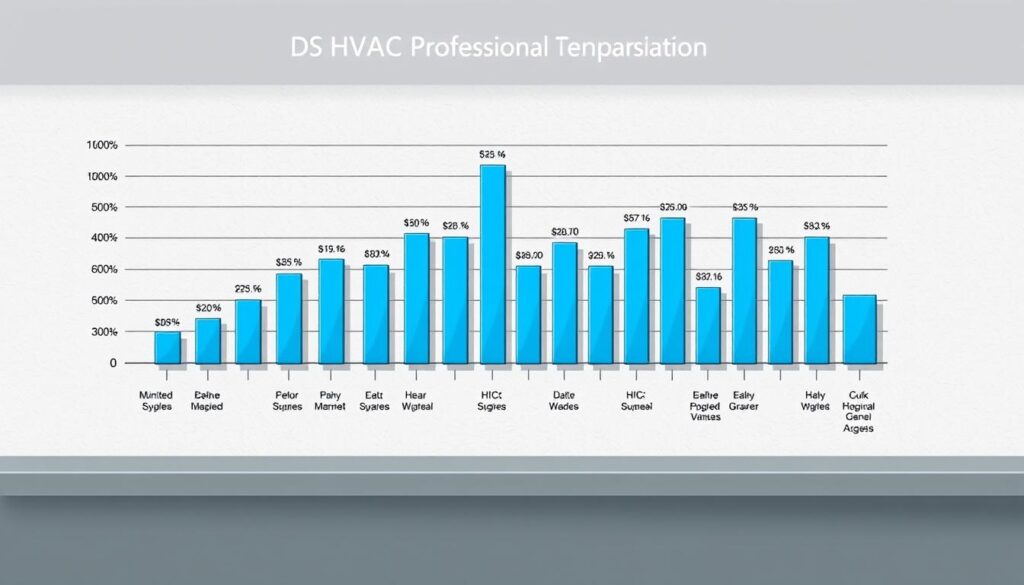Affiliate Disclosure
HVAC Guide Guys is a participant in the Amazon Services LLC Associates Program, an affiliate advertising program designed to provide a means for sites to earn advertising fees by advertising and linking to Amazon.
How Much Do HVAC People Make an Hour? Ever wondered what your earnings could be in the HVAC industry? What if your skills could lead to a rewarding career? A career that keeps homes and businesses comfortable all year?

The HVAC technician hourly rate changes a lot. It shows how important and in-demand this job is. The Bureau of Labor Statistics says HVAC pros make about $50,590 a year. That’s about $24.32 an hour.
Knowing how much HVAC workers make an hour is key if you’re thinking about this career. Your pay can change based on your experience, where you work, your specialty, and how much people need your skills.
This guide will cover HVAC technician wages in detail. We’ll look at starting jobs and advanced roles. You’ll learn about the financial possibilities in this vital technical field.
Key Takeaways
- HVAC technicians earn a median hourly rate of $24.32
- Salary varies by experience, location, and specialization
- Career advancement can significantly increase earning
- Certification and skills impact hourly wages
- Growing industry demand supports competitive compensation
Table of Contents
Understanding HVAC Technician Wages in 2024
The HVAC industry offers great career chances with good pay. As of 2024, HVAC technicians can earn a lot based on their skills, experience, and specialization. This affects their hvac installer wages.
Knowing how much you can earn helps you plan your career. The average hourly rate for HVAC service pay is between $26 and $37. This depends on several important factors.
Base Salary Components
Your HVAC technician salary includes several main parts:
- Base hourly wage
- Geographical location adjustments
- Specialized skill premiums
- Experience level increments
Industry Standard Pay Rates
Pay in the HVAC industry varies in different ways. New technicians might start at $26 per hour. Experienced ones can earn up to $37 hourly.
Overtime and Benefits Overview
Besides base pay, HVAC technicians get extra financial perks:
- Overtime pay at 1.5x standard rates
- Performance-based bonuses
- Health insurance packages
- Retirement contribution plans
Getting advanced certifications and specialized skills can really increase your earnings in HVAC.
Explore Our HVAC Shop
Looking for top-rated HVAC tools, parts, and accessories? Visit our shop and find the perfect solution for your needs.
Visit the ShopNational Average HVAC Salary Breakdown
Understanding hvac contractor earnings is key to your career in the heating, ventilation, and air conditioning field. The national hvac worker income shows a wide range of pay for skilled workers.
Salaries for HVAC technicians vary a lot. This is due to many factors. From starting jobs to more experienced roles, there’s a lot of room for growth.
| Salary Percentile | Annual Earnings | Hourly Rate |
|---|---|---|
| Bottom 10% | $31,000 | $14.90 |
| Median | $50,590 | $24.32 |
| Top 10% | $80,000 | $38.46 |
Your earnings depend on several important things:
- Where you live
- How long you’ve been working
- Any special certifications you have
- The type of industry you work in
“The HVAC industry offers robust financial opportunities for skilled professionals willing to invest in their expertise.” – National HVAC Association
There’s a trend of increasing hvac contractor earnings. This is because of new technology and more demand for energy-saving systems. This could lead to higher pay for you.
How Much Do HVAC People Make an Hour Across Different Experience Levels
Your career in HVAC can greatly affect your hourly pay. Knowing how salaries grow helps you plan your career and set income goals. Salaries in HVAC vary a lot based on experience, skills, and area of focus.
Let’s look at how much HVAC workers make an hour at different career levels:
Entry-Level Positions
At the start of your HVAC career, you can earn about $26.01 an hour. These jobs usually need:
- High school diploma or equivalent
- Technical training certificate
- Basic mechanical skills
- Willingness to learn
Mid-Career Earnings
With more experience and skills, your pay goes up. Mid-career HVAC workers make about $31.59 an hour. At this point, you’ll likely have:
- 3-5 years of practical experience
- Advanced technical certifications
- Expertise in complex HVAC systems
- Strong problem-solving abilities
Senior Level Compensation
Experienced HVAC professionals earn more. Senior-level technicians make about $37.12 an hour. This level is marked by:
- 6-10 years of industry experience
- Advanced professional certifications
- Specialized technical knowledge
- Potential leadership responsibilities
Keep in mind, these figures are national averages. Your actual earnings can change based on where you work, your specialization, and your skills.
Explore Our HVAC Shop
Looking for top-rated HVAC tools, parts, and accessories? Visit our shop and find the perfect solution for your needs.
Visit the ShopTop-Paying States for HVAC Technicians
Your salary as an HVAC mechanic can change a lot based on where you work in the United States. Some places pay HVAC specialists a lot more than others. This makes where you work very important for your income.
The best states for HVAC techs offer great pay. These places need skilled workers because of their tough environments and high demand.
- Alaska: Highest average hourly rate due to extreme climate conditions
- Massachusetts: Strong industrial and residential HVAC infrastructure
- Washington: Growing tech and commercial building sectors
- Connecticut: Robust commercial HVAC market
- Hawaii: Unique climate-specific HVAC requirements
Knowing how salaries vary by region can help plan your HVAC career. Some states might pay less but have lower living costs or special job benefits.
| State | Average Hourly Rate | Annual Salary Range |
|---|---|---|
| Alaska | $42.50 | $88,400 – $95,000 |
| Massachusetts | $39.75 | $82,700 – $89,000 |
| Washington | $38.25 | $79,500 – $85,600 |
| Connecticut | $37.90 | $78,800 – $84,500 |
| Hawaii | $36.60 | $76,200 – $82,000 |
Pro tip: Think about more than just salary. Look at living costs, job competition, and career growth in different states.
“Location can be a game-changer in your HVAC career earnings. Smart professionals research and strategically position themselves in high-demand markets.” – HVAC Industry Expert
Commercial vs Residential HVAC Pay Differences
The HVAC industry offers different earning chances in commercial and residential areas. Knowing the pay differences helps you plan your HVAC career better. This way, you can make the most of your HVAC technician hourly rate.
HVAC workers face different money situations in commercial and residential jobs. The size and complexity of projects affect how much they get paid.
Commercial Project Rates
Commercial HVAC jobs usually pay more because of several reasons:
- Complex system installations
- Large-scale infrastructure needs
- Advanced technical skills needed
- Higher project budgets
Residential Service Earnings
Residential HVAC services offer steady income with various payment models. Technicians make money through:
- Hourly service rates
- Diagnostic fees
- Installation costs
- Maintenance contracts
Specialization Premiums
Technicians who get specialized skills can earn more. Niche expertise in areas like industrial refrigeration or green energy systems can greatly increase their earnings.
Strategic skill development is key to boosting your HVAC income.
Explore Our HVAC Shop
Looking for top-rated HVAC tools, parts, and accessories? Visit our shop and find the perfect solution for your needs.
Visit the ShopCertification Impact on Hourly Wages

Certifications can really boost your hvac installer wages. They also make you more credible in the HVAC field. Professional credentials show you’re an expert and can raise your hvac service pay rate.
Some key certifications that can up your earning game include:
- EPA 608 Certification
- NATE (North American Technician Excellence)
- HVAC Excellence Certification
Getting these certifications is a big step in your career. The EPA 608 Certification, for example, is a must for working with refrigerants. It makes you more attractive to employers right away.
“Certifications are not just pieces of paper – they’re tickets to higher wages and better opportunities.” – HVAC Industry Expert
Now, let’s look at how different certifications can up your wages:
| Certification | Average Wage Increase | Time to Obtain |
|---|---|---|
| EPA 608 | 5-8% | 1-2 weeks |
| NATE Certification | 10-15% | 3-6 months |
| HVAC Excellence | 12-18% | 6-12 months |
Investing in your professional credentials can yield substantial returns in your HVAC career. Employers look up to technicians who keep learning and meet industry standards.
Career Advancement and Salary Growth
HVAC professionals can find new ways to increase their earnings. Moving up in your career can lead to higher pay and more opportunities for growth.
As you gain experience, you’ll find many ways to boost your income and status.
Management Positions
Experienced technicians can move into supervisory roles for better pay. Here are some steps to consider:
- Team Lead Supervisor ($55,000 – $75,000 annually)
- Operations Manager ($65,000 – $90,000 annually)
- Regional Service Director ($85,000 – $120,000 annually)
Business Ownership
Starting your own HVAC company is a great way to increase your earnings. Successful owners can make $250,000 to $500,000 a year.
| Business Stage | Potential Annual Income |
|---|---|
| Startup Phase | $75,000 – $150,000 |
| Established Business | $250,000 – $500,000 |
Additional Income Streams
You can also earn more by adding specialized services:
- Technical Training Instructor
- Smart Home Systems Specialist
- Energy Efficiency Consultant
“The HVAC industry offers remarkable opportunities for those willing to continuously learn and adapt.” – HVAC Industry Expert
By developing your skills and exploring different career paths, you can greatly improve your career and earnings in the HVAC field.
Explore Our HVAC Shop
Looking for top-rated HVAC tools, parts, and accessories? Visit our shop and find the perfect solution for your needs.
Visit the ShopRegional Market Factors Affecting HVAC Wages

Your HVAC professional salaries can change a lot based on where you work in the United States. Different areas have their own economic conditions. These conditions directly affect how much HVAC mechanics get paid.
Climate is a big factor in HVAC technician wages. Places like Arizona, Texas, and Florida pay more because they need a lot of cooling. Areas with really cold winters, like Minnesota and Alaska, also pay more for heating skills.
- Southwestern states: Higher wages due to extreme heat
- Northern regions: Premium for winter system maintenance
- Coastal areas: Specialized marine and salt-resistant HVAC work
How crowded an area is also matters. Cities like New York, Chicago, and Los Angeles have more jobs and better pay. These cities also have a lot of building going on. This means skilled HVAC workers can get good pay.
| Region | Average Hourly Wage | Job Demand |
|---|---|---|
| Northeast | $35.50 | High |
| Southwest | $32.75 | Very High |
| Midwest | $30.25 | Moderate |
| West Coast | $38.00 | High |
Local economic conditions also play a part in HVAC salaries. Places with lots of manufacturing, tech, and real estate pay more. Your skills are more valuable in areas with big growth and development.
Knowing about these regional factors can help you plan your HVAC career for the best pay.
Conclusion
The HVAC industry is full of promise with good pay. Your earnings can grow as you get more experience and skills. The job market is also expected to grow by 5% from 2020 to 2030.
Your income in HVAC depends on several things. Where you work, your specialty, and your certifications matter a lot. Plus, your drive to move up can really help your salary.
Improving your skills and staying up-to-date with new tech is key. This can make you stand out in the HVAC world. Whether you’re just starting or looking to climb the ladder, there are great chances for you.
As we focus more on saving energy, HVAC pros will be even more important. Knowing how to move up and earn more can help you succeed in this field.

